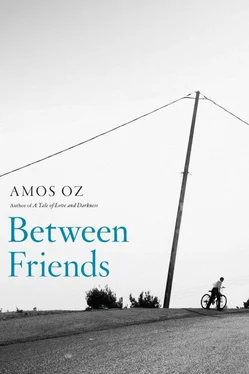Zvi Provizor said, “Your room is very nice,” and added, “Clean. Neat.”
Embarrassed, Luna Blank said, “Thank you. I’m glad.”
But there was no gladness in her voice, only an awkward tension.
Then they drank coffee and ate biscuits and spoke of ornamental trees and fruit trees, of the discipline problems at school now that everything was permitted, of bird migration.
Zvi said, “I read in the newspaper that in Hiroshima, ten years after the bomb, there were still no birds.”
Luna told him again, “You take all the sorrows of the world on your shoulders.”
She also said, “The day before yesterday, I saw a hoopoe on a low branch outside my window.”
And so they began to meet regularly in the early-evening hours, on a bench in the garden, in the shade of a dense bougainvillea, or over coffee in Luna’s room. Zvi would come home from work at four, shower, comb his hair in front of the mirror, change into his ironed khaki trousers and light-blue shirt, and go to join her. Sometimes he would bring seedlings of annuals for her to plant in her small garden. Once he brought her a volume of Yaakov Fichman’s poems. She gave him poppy-seed biscuits in a bag, and a pencil drawing of two cypress trees and a bench. But at eight or eight thirty they would say good night and Zvi would return to his monastic room where the smell of bachelordom hung heavily in the air.
In the dining hall Roni Shindlin said that the Angel of Death had spread its wings over the Black Widow. In the clubhouse, later, Reuvkeh Roth teased Zvi affectionately, “So the hand has found a glove, eh?”
But Zvi and Luna were not upset by the gossip and the sarcasm. The connection between them seemed to grow stronger every day. He told her that in his free time, he was translating a novel by the Polish writer Iwaszkiewicz into Hebrew. The book was full of gentleness and suffering. Iwaszkiewicz believed that the human condition was absurd but touching. Luna listened, her head slightly tilted, lips parted, pouring hot coffee into his cup, as if the coffee were a kind of compensation for Iwaszkiewicz’s sorrow as well as a consolation for his own. She felt that their relationship was precious and she appreciated the way it filled her days, which until then had been so flat and monotonous. One night, she dreamed that they were on a horse together, her breasts pressed against his back and her arms around his waist, riding along a valley between high hills where a frothing river twisted and turned. She decided not to tell Zvi about this dream, even though she had described other dreams to him in detail. Zvi, for his part, blinked and told her that as a child in the Polish town of Yanov, he had dreamed of being a student. Instead, he had been drawn into the newly formed chalutz youth movement and had given up his plans to study. Even so, he had never stopped learning. Carefully gathering the crumbs from the tablecloth, Luna said, “You must have been a very shy young man. You’re still a bit shy now.”
Zvi said, “You don’t really know me.”
Luna said, “Tell me. I’m listening.”
And Zvi said, “Tonight I heard on the radio that a volcano erupted in Chile. Four villages were totally destroyed by the lava flow. Most of the people didn’t stand a chance.”
One evening, as he regaled her with an affecting description of the famine in Somalia, compassion for him so overwhelmed her that she suddenly took his hand and held it to her breast. Zvi trembled and pulled his hand back quickly, with a gesture that was almost violent. His eyes blinked frantically. Never in his adult life had he touched another person intentionally, and he went rigid whenever he was touched. He loved the feel of loose earth and the softness of young stems, but the touch of others, men or women, caused his entire body to stiffen and contract as if he’d been burned. He always tried to avoid handshakes, pats on the back, or the accidental rubbing of elbows at the table in the dining hall. A short time later, he stood up and left.
He didn’t go to see Luna the next day. He had begun to feel that their relationship was heading toward a disastrous place where he did not want to go, a place that repulsed him. Luna, with her usual sensitivity, guessed that she had somehow offended him. She decided to apologize, though she didn’t know what for. Had she asked a question she shouldn’t have asked? Or had she perhaps failed to grasp some important meaning concealed in his words?
Two days later, when he wasn’t in his room, she slipped a note under his door: I’m sorry if I upset you. Can we talk?
Zvi responded with a note of his own: It would be better if we didn’t. It would only end badly.
Still, she waited for him after supper at the foot of the margosa tree near the dining-hall door and said shyly, “Tell me what I did.”
“Nothing.”
“So why are you avoiding me?”
“Try to understand. It’s… pointless.”
They never met on purpose again, and if they happened to pass each other on a path or in the small storeroom, they would exchange nods, hesitate for a moment, then go on their way.
At lunch, Roni Shindlin told his tablemates that the Angel of Death had cut his honeymoon short, and from now on, they were all in danger again. In fact, that very afternoon, Zvi informed the bachelors in the clubhouse that a large bridge in Turkey had collapsed, and at the height of rush hour to boot.
Two or three months later, we noticed that Luna Blank had stopped coming to the classical-music group and had even been absent from several teachers’ meetings. She dyed her hair a coppery red and began to wear bright lipstick. Occasionally she skipped supper. On the Sukkoth holiday, she stayed in the city for a few days and came back wearing a dress we thought was a bit daring, with a long slit up the side. In early autumn, we saw her a few times, sitting on the bench by the large lawn with the basketball coach, a man ten years younger than she was, who came to the kibbutz twice a week. Roni Shindlin said that she was probably learning to dribble at night. Two or three weeks later, she dropped the basketball coach and was seen in the company of the commander of the kibbutz unit of the Fighting Pioneer Youth, a man of twenty-two. There was no way that this could be ignored, and the Education Committee met discreetly to discuss the professional implications.
Every evening, Zvi Provizor would sit alone, utterly still, on the bench next to the fountain he had installed with his own hands and watch the children playing on the lawn. If you passed by and said good evening, he would return the greeting and tell you about the floods in southeastern China.
Late that autumn, without warning and without permission from the kibbutz secretariat, Luna Blank left for America to visit her sister, who had sent her a plane ticket. She was seen one morning at the bus stop wearing the daring dress and a bright-colored scarf, teetering in high heels, and lugging a large suitcase. “Already dressed for Hollywood,” Roni Shindlin said. “The Black Widow is fleeing the Angel of Death.” The secretariat decided to suspend her membership in the kibbutz, pending further investigation.
Meanwhile, Luna Blank’s room remained locked and dark, even though there was a housing shortage and some members of the Housing Committee had their eye on it. Five or six ordinary houseplants — philodendrons, geraniums, cacti — had been left on the small porch and Zvi Provizor would occasionally go by to water and tend to them.
Then came winter. Low clouds lay above the ornamental trees. Thick mud lined the fields and orchards, and the fruit pickers and field hands went to work in the factory. Gray rain fell endlessly. At night, the gutters rattled noisily and a cold wind seeped through cracks in the shutters. Zvi Provizor sat up every night listening to all the news broadcasts, and in the breaks between them, he’d bend over his table and by the light of his gooseneck lamp translate into Hebrew a few lines of Iwaszkiewicz’s anguish-filled novel. The pencil drawing that Luna had given him — two cypress trees and a bench — hung above his bed. The trees looked melancholy; the bench was empty. At ten thirty he’d wrap something around himself and go out on the porch to look at the low-lying clouds and the deserted concrete paths, their wet surface gleaming in the yellow glow of the streetlight. If there was a pause between downpours, he would take a brief nocturnal stroll to see how the plants on Luna’s porch were doing. Fallen leaves had already covered the step, and Zvi thought that he could detect the light scent of soap or shampoo drifting from inside the locked room. He would wander along the empty paths for a while, rain dripping from the tree branches onto his uncovered head, then go back to his room and listen in darkness, his open eyes blinking, to the final news reports of the day. Early one morning, when everything was still blanketed in wet, frozen darkness, he stopped a dairy worker on his way to milk the cows and informed him sadly:
Читать дальше












